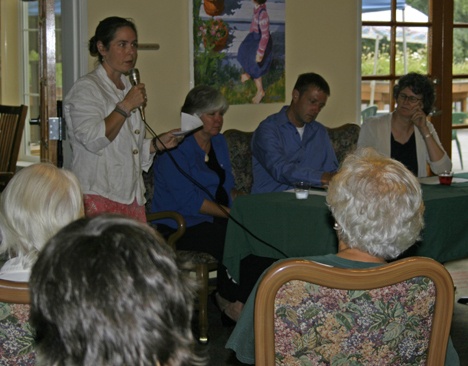Five Vashon nonprofits plan to collaborate to see what they can do together that they could not do alone.
The economic downturn has impacted all five health and human services organizations, some of which are struggling to continue offering services they consider vital to many Vashon residents.
At a public forum on Friday, board members from the Interfaith Council on Homelessness, Vashon Community Care Center, Vashon Maury Community Food Bank, Vashon HouseHold and Vashon Youth & Family Services pledged to meet and strategize how each organization can work with the others to strengthen its own operations.
“I think the boards need to work together,” said Sam Collins, executive director of Vashon Youth & Family Services, at the forum. “I think we could raise so much more money collectively as a group.”
Islanders organized the forum to address how the international financial slump is affecting the Island’s most vulnerable residents. More than 50 people, including all three of Vashon’s state legislators, packed the Vashon Community Care Center (VCCC) dining room on Friday night to discuss the issue.
Islanders asked the three legislators what they could do to help the Island organizations, and they said they would do what they could, noting it had been a painful legislative session.
“We have the worst deficit this year in probably 45 or 50 years,” said Sen. Joe McDermott (D-Seattle). “This year we came in with the largest deficit any of us have ever faced as legislators. … There’s no easy fix.”
Rep. Eileen Cody (D-West Seattle), who chairs the House’s health care and wellness committee, said it’s been tough to cut from health and human services programs, areas she’s worked hard to protect.
Rep. Sharon Nelson (D-Maury Island) lives on Maury Island, and agreed that cuts to human services are exceedingly difficult.
“There’s no magic wand,” she said. “If we had one, we’d be waving it.”
But the trio of lawmakers were enthusiastic about Islanders’ plan for nonprofits to interface. Collaboration among major human services organizations is already the norm in West Seattle, Cody said.
“In calling this meeting, we said we hoped we’d start the dialogue today,” said Truman O’Brien, a VCCC board member, as the forum concluded. “And I think we’ve done that.”
At the meeting, board members from the nonprofits added their names to a list to be included in future collaborations, and e-mails have been flying back and forth between leaders from the organizations since then.
“I think it’s just reached the tipping point,” said Emma Amiad, president of the Interfaith Council on Homelessness, after the forum. “It’s come to the place where all these groups have come to the realization that they all need to work together to get more done.”
This is the first time, Amiad said, that nonprofits have banded together in a meaningful way. She’s hopeful, she added, that the collaboration will strengthen the fundraising potential of each nonprofit while potentially saving all the organizations thousands in individual fundraising costs.
At the forum, Islanders raised various concerns — from the rate of incarceration to the lack of an official governing body on Vashon — but the conversation kept circling back to funding, or lack thereof, as leaders of the different organizations noted.
The Interfaith Council on Homelessness, for example, “just ran out of money,” Amiad said. The organization receives no grants or money from the government and has no idea how it will help Islanders the rest of the year.
The care center will be reimbursed less this year than ever before for its residents who have Medicaid. The center will have to pick up the tab for the difference in what it costs to house a resident and what the government will pay the home to do so, said Susan Tuller, VCCC administrator.
The food bank has seen a 35 percent increase in customers over the last year. Thanks to numerous fundraising drives, the small nonprofit is doing much better than it otherwise would have. Still, keeping up with demand for food can be a challenge there, said executive director Yvonne Pitrof.
Vashon Youth & Family Services was forced to ax its popular in-school programs, Collins said, when it found itself passed over for governmental grants it had previously been awarded.
And Vashon HouseHold, a nonprofit housing developer, is working on two projects that were funded by the government prior to the economic downturn, Sunflower and Mukai Commons.
“Looking to the future, those funds will be much harder to tap into,” said Margaret Cruse, HouseHold project manager. Donations at HouseHold, as with nonprofits worldwide, are down, she added.
Board members from the five organizations plan to get together to discuss their ideas for bolstering each organization’s funding base.
“I think we’re making progress,” Nelson said at the end of Friday’s forum. “The next step is to be united. The recession’s going to continue. There are wonderful organizations that need our help on the Island, and we have to do it together. There’s no other way.”



